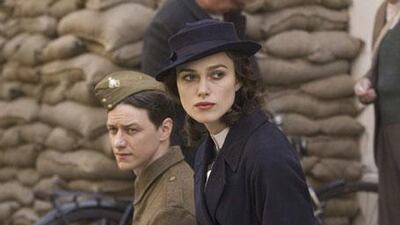As love stories go, is Atonement up there with the likes of Madame Butterfly or Carmen? Traditionalists may not think so, but no matter. Ian McEwan's book is to be turned into an opera due to premiere in 2013. The author revealed his plans earlier this month in a discussion with the composer and radio broadcaster, Michael Berkeley, who is to write the opera's score. The British poet Craig Raine will be penning the English libretto after McEwan declined the role himself. He will still be creatively involved, however, and has grand designs for the work.
"You can do some very big dramatic things with this," he has since told The Times newspaper. "If you were thinking of a large-scale opera then what springs to mind is 380,000 troops on the beaches of Dunkirk. That would be quite a choir." For those who haven't read the original book, or watched the film, the story charts the love - discovered, enacted, complicated and finally dashed - between the young couple Robbie and Cecilia. Their passion for one another is twisted by a bizarre turn of events one hot summer night in the British countryside shortly before the Second World War breaks out.
The book was first published in 2001, and shortlisted for the Booker Prize. The big screen version was released six years later in 2007 with Keira Knightley and James McAvoy as the star couple. It won two Baftas and an Oscar. Its next incarnation is no great leap for McEwan, who has previously worked on musical numbers with Berkeley. Their collaborative efforts stem in part from a close friendship that has lasted for 30 years, for Berkeley is married to McEwan's literary agent, Deborah Rogers. As far back as 1982 the pair collaborated on Or Shall We Die?, an anti-nuclear weapons, pacifist oratorio. In 2008, the two produced the opera For You.
It's just one of an increasing number of contemporary operas that have sprung up in recent decades; recent being a relative term when discussing opera, given that so many of those deemed classics were penned many centuries ago. In 1982, The Postman Always Rings Twice was turned into an opera, with a libretto written by the British composer Colin Graham, who was also involved in a 1994 opera called The Dangerous Liaisons. If you can't guess what literary work that was based on, then you shouldn't be thinking about opera in the first place. Have you tried reality television instead?
Graham's CV also lists his role as stage director to an operatic adaptation on another well-known work, A Streetcar Named Desire in 1998. So popular and beloved is the story that the production has since been whisked across the world. And think La Pulcina Piccola sounds like something penned by Verdi? Think again. It's an operatic, Italian spin-off based on the story of Chicken Little with music written by Henry Krieger, who also wrote the score to Dreamgirls.
In 2000, the Danish Royal Opera premiered a version of Margaret Atwood's The Handmaid's Tale in Copenhagen to generally positive reviews. It subsequently travelled to North America and London. And then in 2003, up popped one of the most controversial opera productions, Jerry Springer: The Opera. The premiere in London had smartly-dressed, traditional operagoers clucking with disapproval. But it's now won several theatre awards, travelled to New York, and been licensed to regional theatres in America, as well as in Canada and Australia. Its popularity underlying the point that opera can be a medium accessible - and enjoyable - to all, instead of an art form around which exists a deep-seated snobbery.
It also seems topical to mention that Alice in Wonderland has been transformed into opera. First by the American composer Peter Westergaard in 2006. And then in 2007, marking the first opera from Korean composer, Unsuk Chin, who co-wrote the piece with the American playwright David Henry Hwang. After all, how better to attract more youthful opera audiences than through operatic tales they might have heard of with scores that they can understand?

